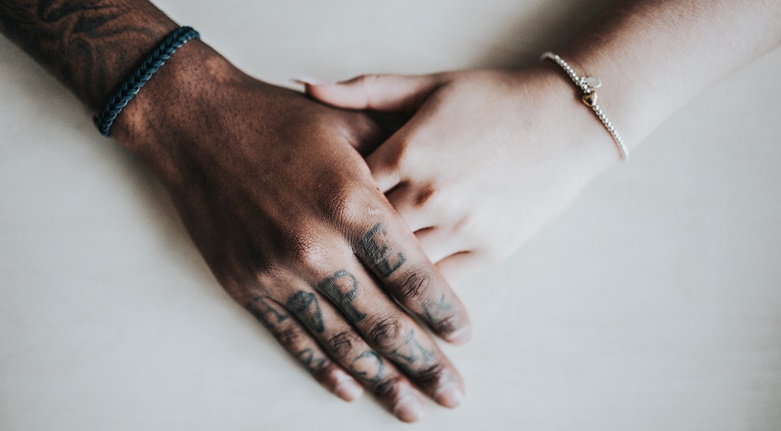Diaspora Dialogue

Never before I saw someone like him. His distinctive face seemed sculptured, at least as long as he didn’t smile. His smile, that could break the hardest concrete, that broadly and shingly could spread through time and space and bewitch my senses.
He lived, worked and even loved for a home that captured him in so many ways. After some time he tried to untie those ties with hesitant glances and gentle touches.
But with my phrases and questions about being and having of origin and history I couldn’t untie his love that I longed for, but pain. Pain he tried to hide from me, pain, which suddenly transformed his smiling lips into a frozen cleft. It was not only his, it was the bundled pain of all those past generations, released through my words.
He said: “In the beginning was the word, that’s how mankind recites god’s words. Mankind once served in a common world through words over places and borders. But the words were followed by actions and sins, they built fences, moved and occupied houses and replaced god-given live with senseless dying.
Now tell me, how should I speak, even live, without hating?
How should I speak without hating, when words dare to let red hail pelt down?
How should I speak without hating, when lies write manifests that leave behind black ashes?
How should I hate without living, when blood is sticking to me, blood that took the lives of all those who laughed?
Diaspora means far away from everything, but it does not mean coldblooded indifferently to all the prospective terror.
The falling distance dyes itself black, the last hope is inherited by mankind in black. Black, pitch-black in front of my eyes, I can barely believe this cruelness, I stare at this shit unbelieving, I can seemingly convince only with hate.
“Homeland”, the hot tear screams and for one lifetime it echoes in the bloodless heart chamber, before it dissolvingly dries out, left and dried out – with one word defeated.”
The last word was said for him and his lips remained suddenly sealed up.
“With one word defeated?” I asked him quietly and broke the silence.
“In the beginning was your smile. Your smile, that blossomed and glowed, when you talked about memories filled with warm winds that could rock the poppy fields, about childhood and home, your eyes filled with longing.
When I think of home, I am looking for your ease, your smile in my thoughts, I feel pure bliss.
Yes, we are the lost children of the diaspora, read Pamuk and Şafak and Schami, quote Rumi and “The great divan” and enjoy secured page after page hidden stories, filled with tears of sadness, rage, happiness and overcome like this from time to time the pain.
You don’t believe me, even though my home has been painfully far away and out of my sight, even though my heart is breaking in front of you?
Now tell me, how should I live without loving?
How should I live without loving, when driven-out philosophies shift yellowed doctrine?
How should I live without loving, when generations are expelled, but the diaspora has stayed the same?
How can you love without forgiving, when they give us all their gifts so we can live on with hope?
Diaspora means for all the fallen, captives, and those who stayed to fight for them, for us together. Diaspora means hope, means love for life.”
His following smile made me exhale liberated and happily.
„How could I continue to live without loving home, without loving you.“
Cansev Duru

Leave a Reply